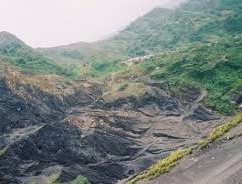Articles and News
Diamond and Gem News: Dominion CEO Exits; Will Emerald Mining Become The Next PR Problem? December 12, 2018 (0 comments)

Are Emeralds The Next Conflict After Diamonds?
Coscuez, Colombia—Fura Gems, a publicly traded company based in Dubai and listed in Toronto, Canada, is seeking to resuscitate the ancient Coscuez emerald mine in Colombia. The mine, which dates back 400 years, was a top-producing source of emeralds until the late 1990s, when it became obsolete. (Image: Jorge Adeler)
But obsolete doesn’t equal barren. Reuters reports that hundreds of local residents have been digging informally at Coscuez for years, combing the shuttered mine’s dozens of tunnels for gems to sell. For many, digging and selling in the difficult mountain terrain, left, is how they earn a living, much like the artisanal diamond diggers in Africa. While only a rare few will strike it rich, most diggers earn enough to survive.
But Fura, which acquired the mine last year and has invested $10 million in it, wants to restrict informal diggers’ access to the mine tunnels. They’ve pledged to close the tunnels gradually and help the diggers find alternative employment—such as sewing or farming—in the hopes this approach will avert the kind of violence that happened in nearby Muzo, where crime gangs attacked the mine, owned by MTC.
Fura CEO Dev Shetty told Reuters more than 96% of the company’s employees come from the region already and he says Fura eventually plans to employ 400 at the mine. In theory, this should be a win-win solution, but not all diggers are on board with the idea. While informal mining tends to be more lucrative than other forms of employment--like sewing or farming--many diggers also prefer it even to a formal job with a mining company.
MTC hired most of the informal diggers already working at the Muzo mine, but the company told Reuters many diggers prefer the old method where they worked under the table and tax-free. They’re also unhappy that MTC has stopped dumping mine debris in the river: for informal miners, protecting the environment means depriving them of another source of gems to sell.
Fura, meanwhile, is treading lightly. It has shuttered only four of its 49 tunnels, CEO Dev Shetty told Reuters. While the company doesn’t officially allow informal digging, Shetty admits policing an entire mountain isn’t practical.
But as the jewelry industry learned with artisanal diamond diggers in Africa, it can be a choice between a rock and a hard place. Informal diggers do risk their lives for subsistence income, so a mining company that simply looks the other way instead of hiring them officially can easily become a target of NGOs' ire, (especially if there's an accident like a tunnel collapse) but if the company just closes the tunnels it may be equally blasted in the court of public opinion for taking away the diggers' livelihood altogether.
Dominion Diamond’s Revolving Door Continues
Missoula, MT—Patrick Evans, CEO of Canada’s Dominion Diamond, resigned December 5 after barely a year on the job, the latest in a string of high-level departures since the company was acquired by billionaire Dennis Washington late last year. Four other high-level executives have left since the acquisition, Bloomberg reports.
COO Shane Durgin was named CEO two days later. Evans told Bloomberg he will stay on as adviser until the end of 2019.
Dominion has stakes in both the Ekati mine and Diavik, a joint venture with mining giant Rio Tinto. Evans came to Dominion from Mountain Province Diamonds, where he was CEO for more than a decade. Mountain Province, together with De Beers Canada, operates a third Canadian diamond mine, Gahcho Kue.







